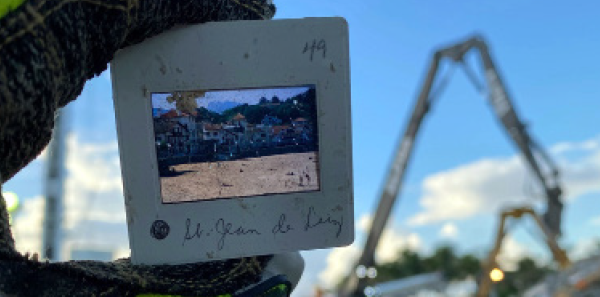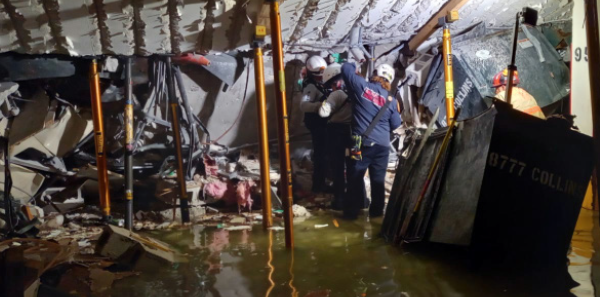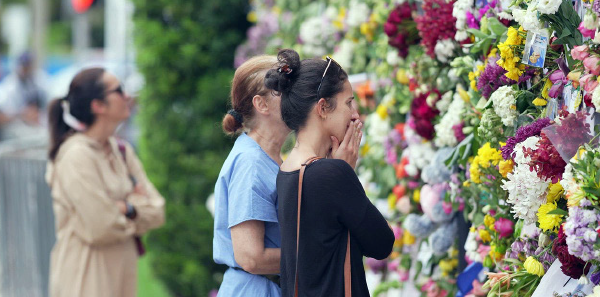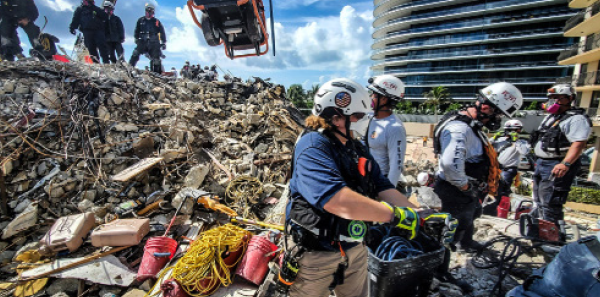

Explore This Issue
ACEP Now: Vol 40 – No 10 – October 2021After being on-site for two and a half weeks, Dr. Abo glanced down and spotted this photo from 1968 right next to his boot.
Benjamin Abo
A Place to Recover
We noticed a small memorial had started on the chain-link fence next to our tents. Someone had hung a photo and some flowers upside down so they would dry. I added a stuffed alligator we found inside the collapse. Within days, the entire fence was covered in objects to memorialize the victims. Now it takes up the whole block. The problem was that our rescue team’s tents, each with 16 beds inside, were set up on the tennis courts right inside that fence. We were working all night and trying to sleep in those tents during the day, but all we could hear were people visiting the memorial, sobbing, grieving. There was no place for us to get away from it, no quiet place to recover both physically and emotionally between our shifts. After two weeks, we moved our tents to a park a few blocks away.

Visitors spend time at the memorial that grew on the fence next to the site.
Rick Stephens of Miami-Dade Fire Rescue
Preparation Versus Reality
I started volunteering with EMS when I was 16 years old in New Jersey and then in Pittsburgh during college. My Pittsburgh mentors taught me that we are not paid for what we do but for what we are prepared to do.
I’ve been working in disaster medicine a long time—Katrina, Haiti, Dorian, plus a lot of local responses to homicides, accidents, and various things. I’ve always identified with Miami-Dade Fire Rescue’s motto, “Always ready, proud to serve.” But this was different. This was my community. These were people I knew.
I will never forget where I was standing when we found the daughter of one of our firefighters. I will always remember seeing his face in that moment and the way we all lined up for a procession to gently take her out of the rubble. Our teams are as ready as we can be, but there is no way to prepare for moments like that.

The Urban Search and Rescue team worked 24-7 in 12-hour shifts in and atop the debris, searching, geolocating information, and assuring safety.
Rick Stephens of Miami-Dade Fire Rescue
Peer Support
We are all dealing with so many emotions. I think it helps to talk about it, so I encourage that for our team members. I think it’s important that we don’t hold it in. I remember seeing a physician colleague of mine. As we hugged hello, we both cried. (And that’s OK—I felt better after and went back to work.) It’s not helpful when outside people ask for gritty details about what we are witnessing, but it can be cathartic when we get to talk about our feelings and what we are processing. For me, seeing and knowing that everyone is looking out for one another, that helps. But I also think this is going to hit harder once we aren’t so busy and we have more time to think about it.
Pages: 1 2 3 4 | Single Page





One Response to “Rescue Team Doctor at the Surfside Condo Collapse Shares Experience”
October 27, 2021
Laurie BryantI had the privilege to work alongside Dr. Ben Abo (Medical team Manager for FTF-1) at the Surfside Collapse while I served as Medical Team Manager for FTF-5. A truly representative article…in its most raw form. This is why i pursued emergency medicine, and working alongside leaders such as Ben make me a better physician.
Respectfully,
Laurie Bryant, DO
Jacksonville, FL